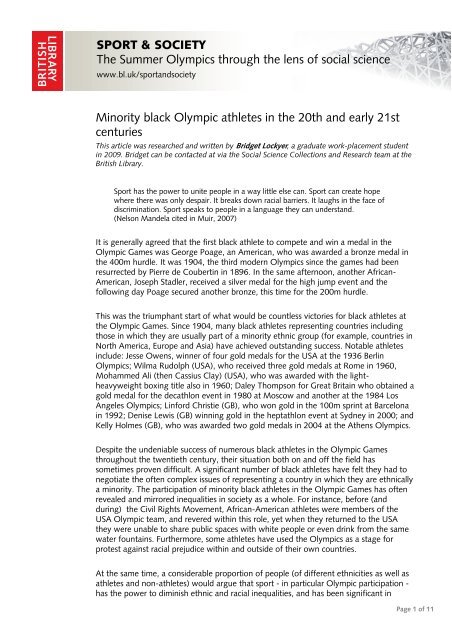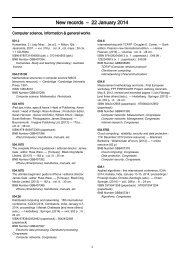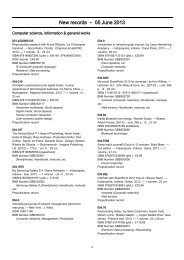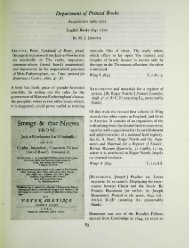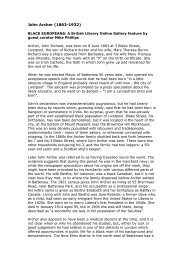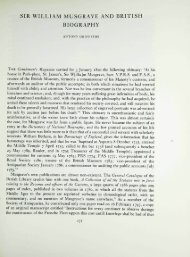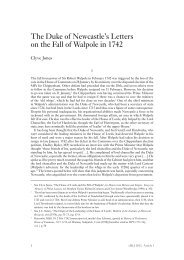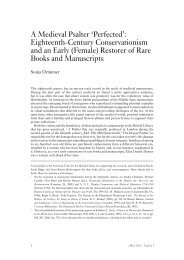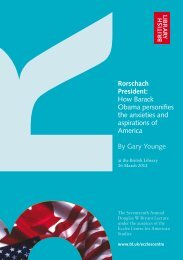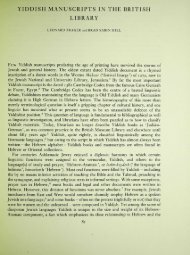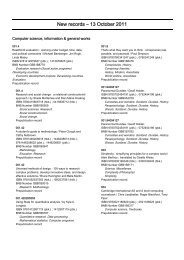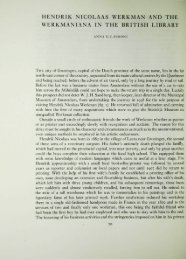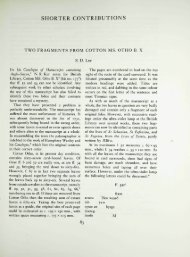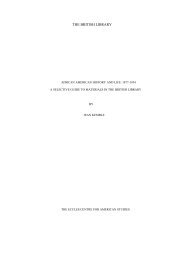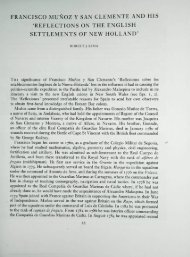Minority black Olympic athletes in the 20th and early ... - British Library
Minority black Olympic athletes in the 20th and early ... - British Library
Minority black Olympic athletes in the 20th and early ... - British Library
Create successful ePaper yourself
Turn your PDF publications into a flip-book with our unique Google optimized e-Paper software.
SPORT & SOCIETY<br />
The Summer <strong>Olympic</strong>s through <strong>the</strong> lens of social science<br />
www.bl.uk/sport<strong>and</strong>society<br />
<strong>M<strong>in</strong>ority</strong> <strong>black</strong> <strong>Olympic</strong> <strong>athletes</strong> <strong>in</strong> <strong>the</strong> <strong>20th</strong> <strong>and</strong> <strong>early</strong> 21st<br />
centuries<br />
This article was researched <strong>and</strong> written by Bridget Lockyer, a graduate work-placement student<br />
<strong>in</strong> 2009. Bridget can be contacted at via <strong>the</strong> Social Science Collections <strong>and</strong> Research team at <strong>the</strong><br />
<strong>British</strong> <strong>Library</strong>.<br />
Sport has <strong>the</strong> power to unite people <strong>in</strong> a way little else can. Sport can create hope<br />
where <strong>the</strong>re was only despair. It breaks down racial barriers. It laughs <strong>in</strong> <strong>the</strong> face of<br />
discrim<strong>in</strong>ation. Sport speaks to people <strong>in</strong> a language <strong>the</strong>y can underst<strong>and</strong>.<br />
(Nelson M<strong>and</strong>ela cited <strong>in</strong> Muir, 2007)<br />
It is generally agreed that <strong>the</strong> first <strong>black</strong> athlete to compete <strong>and</strong> w<strong>in</strong> a medal <strong>in</strong> <strong>the</strong><br />
<strong>Olympic</strong> Games was George Poage, an American, who was awarded a bronze medal <strong>in</strong><br />
<strong>the</strong> 400m hurdle. It was 1904, <strong>the</strong> third modern <strong>Olympic</strong>s s<strong>in</strong>ce <strong>the</strong> games had been<br />
resurrected by Pierre de Coubert<strong>in</strong> <strong>in</strong> 1896. In <strong>the</strong> same afternoon, ano<strong>the</strong>r African-<br />
American, Joseph Stadler, received a silver medal for <strong>the</strong> high jump event <strong>and</strong> <strong>the</strong><br />
follow<strong>in</strong>g day Poage secured ano<strong>the</strong>r bronze, this time for <strong>the</strong> 200m hurdle.<br />
This was <strong>the</strong> triumphant start of what would be countless victories for <strong>black</strong> <strong>athletes</strong> at<br />
<strong>the</strong> <strong>Olympic</strong> Games. S<strong>in</strong>ce 1904, many <strong>black</strong> <strong>athletes</strong> represent<strong>in</strong>g countries <strong>in</strong>clud<strong>in</strong>g<br />
those <strong>in</strong> which <strong>the</strong>y are usually part of a m<strong>in</strong>ority ethnic group (for example, countries <strong>in</strong><br />
North America, Europe <strong>and</strong> Asia) have achieved outst<strong>and</strong><strong>in</strong>g success. Notable <strong>athletes</strong><br />
<strong>in</strong>clude: Jesse Owens, w<strong>in</strong>ner of four gold medals for <strong>the</strong> USA at <strong>the</strong> 1936 Berl<strong>in</strong><br />
<strong>Olympic</strong>s; Wilma Rudolph (USA), who received three gold medals at Rome <strong>in</strong> 1960,<br />
Mohammed Ali (<strong>the</strong>n Cassius Clay) (USA), who was awarded with <strong>the</strong> ligh<strong>the</strong>avyweight<br />
box<strong>in</strong>g title also <strong>in</strong> 1960; Daley Thompson for Great Brita<strong>in</strong> who obta<strong>in</strong>ed a<br />
gold medal for <strong>the</strong> decathlon event <strong>in</strong> 1980 at Moscow <strong>and</strong> ano<strong>the</strong>r at <strong>the</strong> 1984 Los<br />
Angeles <strong>Olympic</strong>s; L<strong>in</strong>ford Christie (GB), who won gold <strong>in</strong> <strong>the</strong> 100m spr<strong>in</strong>t at Barcelona<br />
<strong>in</strong> 1992; Denise Lewis (GB) w<strong>in</strong>n<strong>in</strong>g gold <strong>in</strong> <strong>the</strong> heptathlon event at Sydney <strong>in</strong> 2000; <strong>and</strong><br />
Kelly Holmes (GB), who was awarded two gold medals <strong>in</strong> 2004 at <strong>the</strong> A<strong>the</strong>ns <strong>Olympic</strong>s.<br />
Despite <strong>the</strong> undeniable success of numerous <strong>black</strong> <strong>athletes</strong> <strong>in</strong> <strong>the</strong> <strong>Olympic</strong> Games<br />
throughout <strong>the</strong> twentieth century, <strong>the</strong>ir situation both on <strong>and</strong> off <strong>the</strong> field has<br />
sometimes proven difficult. A significant number of <strong>black</strong> <strong>athletes</strong> have felt <strong>the</strong>y had to<br />
negotiate <strong>the</strong> often complex issues of represent<strong>in</strong>g a country <strong>in</strong> which <strong>the</strong>y are ethnically<br />
a m<strong>in</strong>ority. The participation of m<strong>in</strong>ority <strong>black</strong> <strong>athletes</strong> <strong>in</strong> <strong>the</strong> <strong>Olympic</strong> Games has often<br />
revealed <strong>and</strong> mirrored <strong>in</strong>equalities <strong>in</strong> society as a whole. For <strong>in</strong>stance, before (<strong>and</strong><br />
dur<strong>in</strong>g) <strong>the</strong> Civil Rights Movement, African-American <strong>athletes</strong> were members of <strong>the</strong><br />
USA <strong>Olympic</strong> team, <strong>and</strong> revered with<strong>in</strong> this role, yet when <strong>the</strong>y returned to <strong>the</strong> USA<br />
<strong>the</strong>y were unable to share public spaces with white people or even dr<strong>in</strong>k from <strong>the</strong> same<br />
water founta<strong>in</strong>s. Fur<strong>the</strong>rmore, some <strong>athletes</strong> have used <strong>the</strong> <strong>Olympic</strong>s as a stage for<br />
protest aga<strong>in</strong>st racial prejudice with<strong>in</strong> <strong>and</strong> outside of <strong>the</strong>ir own countries.<br />
At <strong>the</strong> same time, a considerable proportion of people (of different ethnicities as well as<br />
<strong>athletes</strong> <strong>and</strong> non-<strong>athletes</strong>) would argue that sport - <strong>in</strong> particular <strong>Olympic</strong> participation -<br />
has <strong>the</strong> power to dim<strong>in</strong>ish ethnic <strong>and</strong> racial <strong>in</strong>equalities, <strong>and</strong> has been significant <strong>in</strong><br />
Page 1 of 11
Sport <strong>and</strong> Society: <strong>the</strong> Summer <strong>Olympic</strong>s through <strong>the</strong> lens of social science<br />
overcom<strong>in</strong>g problems of racial discrim<strong>in</strong>ation. After all, <strong>the</strong> <strong>Olympic</strong> Games is an<br />
environment where people from a broad range of ethnic, cultural <strong>and</strong> socio-economic<br />
backgrounds compete toge<strong>the</strong>r <strong>and</strong> are watched by an equally diverse audience. On <strong>the</strong><br />
o<strong>the</strong>r h<strong>and</strong>, some would (<strong>and</strong> have) argued that <strong>the</strong> <strong>in</strong>volvement of m<strong>in</strong>ority <strong>black</strong><br />
<strong>athletes</strong> <strong>in</strong> <strong>the</strong> <strong>Olympic</strong> arena, <strong>and</strong> <strong>in</strong> particular scrut<strong>in</strong>y of <strong>the</strong>ir successes with<strong>in</strong> this<br />
field, has exacerbated exist<strong>in</strong>g racial prejudices <strong>and</strong> stereotypes <strong>in</strong> ways which <strong>in</strong>tensify<br />
social, economic <strong>and</strong> cultural divisions between ethnic groups.<br />
JESSE OWENS AND THE NAZI OLYMPICS<br />
It was <strong>in</strong> Berl<strong>in</strong> <strong>in</strong> 1936, a unique po<strong>in</strong>t <strong>in</strong> time for <strong>the</strong> <strong>Olympic</strong> Games, that Jesse Owens<br />
triumphed <strong>in</strong> <strong>the</strong> face of extreme racial prejudice through his successes on <strong>the</strong> field.<br />
Germany was under Nazi occupation, <strong>and</strong> Chancellor Adolf Hitler was eager not only to<br />
promote <strong>the</strong> city of Berl<strong>in</strong>, but also to demonstrate Aryan athletic 'superiority'. Owens,<br />
<strong>the</strong>n 22, was one of a number of <strong>black</strong> <strong>athletes</strong> <strong>in</strong> <strong>the</strong> USA team which also <strong>in</strong>cluded<br />
Cornelius Johnson, who would go onto w<strong>in</strong> gold for <strong>the</strong> high jump. Somewhat<br />
surpris<strong>in</strong>gly given <strong>the</strong> context, <strong>the</strong> <strong>black</strong> <strong>athletes</strong> enjoyed more freedom <strong>in</strong> Nazi Germany<br />
than <strong>the</strong>y did back home <strong>in</strong> <strong>the</strong> USA, <strong>and</strong> were able to mix freely with <strong>the</strong> white majority<br />
population. Unsurpris<strong>in</strong>gly, however, Hitler appeared to purposely snub <strong>the</strong> <strong>black</strong><br />
<strong>athletes</strong>, refus<strong>in</strong>g to congratulate <strong>the</strong> <strong>black</strong> w<strong>in</strong>ners, although a different version of<br />
events claims that he was merely fulfill<strong>in</strong>g his role as host to rema<strong>in</strong> neutral (Barry,<br />
1975). What is certa<strong>in</strong> is that Hitler was extremely displeased with <strong>the</strong> defeat of German<br />
<strong>athletes</strong> by <strong>black</strong> Americans <strong>in</strong> several key track <strong>and</strong> field events, as recalled by his<br />
architect Albert Speer (Speer, 1970). Owens <strong>and</strong> his o<strong>the</strong>r w<strong>in</strong>n<strong>in</strong>g <strong>black</strong> team-mates,<br />
through <strong>the</strong>ir success <strong>in</strong> <strong>the</strong> <strong>Olympic</strong> arena had unsettled Hitler's racial purity<br />
propag<strong>and</strong>a, especially as <strong>the</strong> German audience were undoubtedly enamoured with<br />
Owens (Barry, 1975). Although this was a relatively small victory, particularly <strong>in</strong> light of<br />
<strong>the</strong> Nazi's atrocities, it is however an important example of how <strong>the</strong> <strong>Olympic</strong> Games<br />
have acted as a stage for play<strong>in</strong>g out <strong>the</strong> struggle for racial equality.<br />
What is also <strong>in</strong>terest<strong>in</strong>g about Jesse Owens is that despite his success <strong>and</strong> huge<br />
popularity, when he returned from <strong>the</strong> Games he struggled to f<strong>in</strong>d work with<strong>in</strong> <strong>the</strong><br />
sport<strong>in</strong>g realm <strong>and</strong> was unable to secure any lucrative sponsorship deals. Owens found<br />
himself <strong>in</strong> low-status, low-paid jobs, eventually fil<strong>in</strong>g for bankruptcy; his team mate<br />
Cornelius Johnson faded <strong>in</strong>to similar obscurity (Edmondson, 2007). Unfortunately, this<br />
appears to be a common story when <strong>the</strong> long-term careers of m<strong>in</strong>ority <strong>black</strong> <strong>athletes</strong> are<br />
uncovered.<br />
BLACK OLYMPIANS AND THE CIVIL RIGHTS MOVEMENT<br />
Ano<strong>the</strong>r extremely successful m<strong>in</strong>ority <strong>black</strong> athlete was Wilma Rudolph, born <strong>in</strong><br />
Tennessee <strong>in</strong> 1940. She was one of <strong>the</strong> last children of a very large family, <strong>and</strong> grew up<br />
<strong>in</strong> economic hardship. She was born prematurely <strong>and</strong> suffered ill health as a child,<br />
contract<strong>in</strong>g scarlet fever <strong>and</strong> double pneumonia, <strong>and</strong> was unable to walk unaided until<br />
<strong>the</strong> age of eight due to paralysis <strong>in</strong> her left leg (Bunch <strong>and</strong> Rob<strong>in</strong>son, 1985). Rudolph<br />
was able to overcome <strong>the</strong>se obstacles <strong>and</strong> by <strong>the</strong> time she reached high school age, was<br />
a promis<strong>in</strong>g athlete. Recommended by her high school coach, she was able to enter <strong>the</strong><br />
Tennessee State University team when she was just fifteen, <strong>and</strong> was quickly recognised<br />
as one of <strong>the</strong>ir fastest female spr<strong>in</strong>ters. She attended <strong>the</strong> Melbourne <strong>Olympic</strong> Games <strong>in</strong><br />
1956, but did not w<strong>in</strong> a medal. However, when Rudolph was twenty, she travelled to<br />
<strong>M<strong>in</strong>ority</strong> <strong>black</strong> <strong>Olympic</strong> <strong>athletes</strong> <strong>in</strong> <strong>the</strong> <strong>20th</strong> <strong>and</strong> <strong>early</strong> 21st centuries Page 2 of 11
Sport <strong>and</strong> Society: <strong>the</strong> Summer <strong>Olympic</strong>s through <strong>the</strong> lens of social science<br />
Rome to compete <strong>in</strong> <strong>the</strong> 1960 <strong>Olympic</strong> Games. Here she won three gold medals, <strong>the</strong><br />
first female American to do so, <strong>in</strong> <strong>the</strong> 100m <strong>and</strong> 200m spr<strong>in</strong>ts <strong>and</strong> <strong>the</strong> 400m relay. She<br />
was exceptionally popular with <strong>the</strong> <strong>Olympic</strong> audience, <strong>the</strong> Italians nicknamed her ‘La<br />
Gazella Nera’ (<strong>the</strong> <strong>black</strong> gazelle), <strong>the</strong> French ‘La Perle Noir’ (<strong>the</strong> <strong>black</strong> pearl),<br />
demonstrat<strong>in</strong>g cl<strong>early</strong> that her race was, for <strong>the</strong> audience, a significant def<strong>in</strong><strong>in</strong>g category.<br />
(Smith, 2006: 61).<br />
Wilma Rudolph<br />
After <strong>the</strong> <strong>Olympic</strong>s, Wilma Rudolph embarked on a European tour with her team-mates,<br />
<strong>and</strong> was received warmly by thous<strong>and</strong>s of fans (<strong>in</strong>deed a wax-work model was placed <strong>in</strong><br />
Madame Tussauds <strong>in</strong> her honour). She returned home to a big welcom<strong>in</strong>g ceremony <strong>in</strong><br />
her hometown of Clarksville, Tennessee <strong>and</strong> made national television appearances<br />
(Davis, 1992). Despite her considerable success <strong>and</strong> fame, Rudolph felt she had reached<br />
her peak at a young age, <strong>and</strong> with<strong>in</strong> <strong>the</strong> next few years several female competitors were<br />
able to beat her records. She retired <strong>and</strong> moved <strong>in</strong> to teach<strong>in</strong>g <strong>and</strong> coach<strong>in</strong>g, <strong>and</strong> was<br />
asked to be part of ‘Operation Champ’ <strong>in</strong> 1967, a government programme aimed at<br />
<strong>in</strong>spir<strong>in</strong>g young people <strong>in</strong> deprived areas to participate <strong>in</strong> sport (Davis, 1992: 128-9).<br />
Wilma Rudolph was a success story, not only because she demonstrated what m<strong>in</strong>ority<br />
<strong>black</strong> <strong>athletes</strong> could achieve with<strong>in</strong> a broader context of racial prejudice, but also<br />
because she was able to ma<strong>in</strong>ta<strong>in</strong> a successful career with<strong>in</strong> <strong>the</strong> sport<strong>in</strong>g world after her<br />
retirement.<br />
Cassius Clay, who would later become world famous as Mohammed Ali, also competed<br />
<strong>in</strong> <strong>the</strong> 1960 Rome <strong>Olympic</strong>s, w<strong>in</strong>n<strong>in</strong>g <strong>the</strong> light-heavyweight box<strong>in</strong>g title. For Clay,<br />
<strong>Olympic</strong> participation revealed <strong>the</strong> hypocrisy of American society at that time. At <strong>the</strong><br />
<strong>Olympic</strong>s his victory was widely celebrated, but when he returned home to Louisville <strong>in</strong><br />
Kentucky (<strong>the</strong> <strong>Olympic</strong> medal <strong>in</strong> pride of place round his neck), he recalls be<strong>in</strong>g ordered<br />
out by <strong>the</strong> owner of a restaurant, where once outside he was followed by a gang of<br />
white men who attacked him. Clay was so frustrated that he drove to a bridge over <strong>the</strong><br />
Ohio River <strong>and</strong> dropped his <strong>Olympic</strong> gold medal <strong>in</strong>to <strong>the</strong> water (Bunch <strong>and</strong> Rob<strong>in</strong>son,<br />
1985: 49). Cassius Clay changed his name to Mohammed Ali <strong>in</strong> 1964 after jo<strong>in</strong><strong>in</strong>g <strong>the</strong><br />
Nation of Islam, a radical group which endorsed separatism between <strong>black</strong> <strong>and</strong> white<br />
people (Wigg<strong>in</strong>s, 1997: 152). Ali was active <strong>in</strong> speak<strong>in</strong>g out aga<strong>in</strong>st <strong>the</strong> oppression of<br />
<strong>black</strong> people <strong>in</strong> <strong>the</strong> USA. Fur<strong>the</strong>rmore, when <strong>the</strong> U.S. Army attempted to draft him <strong>in</strong>to<br />
fight<strong>in</strong>g <strong>in</strong> <strong>the</strong> Vietnam War, he declared himself a conscientious objector, famously<br />
say<strong>in</strong>g: ‘I a<strong>in</strong>’t got no quarrel with <strong>the</strong>m Viet Cong’, add<strong>in</strong>g ‘no Viet Cong ever called me<br />
a nigger’ (Sexton, 2006: 253). Ali was one of many m<strong>in</strong>ority <strong>black</strong> <strong>athletes</strong> who were<br />
only too aware of <strong>the</strong> <strong>in</strong>equalities <strong>and</strong> prejudice embedded with<strong>in</strong> American society.<br />
<strong>M<strong>in</strong>ority</strong> <strong>black</strong> <strong>Olympic</strong> <strong>athletes</strong> <strong>in</strong> <strong>the</strong> <strong>20th</strong> <strong>and</strong> <strong>early</strong> 21st centuries Page 3 of 11
Sport <strong>and</strong> Society: <strong>the</strong> Summer <strong>Olympic</strong>s through <strong>the</strong> lens of social science<br />
By 1960, <strong>the</strong> Civil Rights Movement <strong>in</strong> <strong>the</strong> USA was already well under way. From <strong>the</strong><br />
1950s onwards, <strong>black</strong> Americans were <strong>in</strong>creas<strong>in</strong>gly active <strong>and</strong> organised <strong>in</strong> address<strong>in</strong>g<br />
<strong>the</strong> <strong>in</strong>justice of American society: <strong>the</strong> segregation of <strong>black</strong> <strong>and</strong> white; <strong>the</strong> discrim<strong>in</strong>ation<br />
<strong>black</strong> Americans faced <strong>in</strong> employment <strong>and</strong> hous<strong>in</strong>g; <strong>the</strong> disenfranchisement of <strong>black</strong><br />
people on electoral registers <strong>and</strong> <strong>the</strong> widespread violence <strong>and</strong> prejudice <strong>the</strong>y were forced<br />
to endure. Rosa Parks is popularly remembered as beg<strong>in</strong>n<strong>in</strong>g <strong>the</strong> movement, hav<strong>in</strong>g<br />
refused to give up her bus seat to a white passenger <strong>in</strong> 1955, although o<strong>the</strong>r <strong>in</strong>cidences<br />
of this k<strong>in</strong>d had occurred previously. Until <strong>the</strong> mid-1960s, <strong>the</strong> movement was<br />
predom<strong>in</strong>antly non-violent, led by Mart<strong>in</strong> Lu<strong>the</strong>r-K<strong>in</strong>g, <strong>the</strong> protests <strong>in</strong>clud<strong>in</strong>g bus<br />
boycotts, sit-<strong>in</strong>s <strong>and</strong> marches. The movement did achieve some breakthroughs:<br />
segregation was dim<strong>in</strong>ish<strong>in</strong>g <strong>and</strong> <strong>black</strong> Americans were slowly obta<strong>in</strong><strong>in</strong>g more vot<strong>in</strong>g<br />
rights. However, a grow<strong>in</strong>g m<strong>in</strong>ority felt this did not sufficiently address <strong>the</strong> depth of<br />
racial <strong>in</strong>equality, <strong>and</strong> <strong>the</strong> more radical Black Power Movement developed, exacerbated<br />
by Lu<strong>the</strong>r K<strong>in</strong>g’s assass<strong>in</strong>ation <strong>in</strong> April 1968.<br />
By <strong>the</strong> 1968 <strong>Olympic</strong>s <strong>in</strong> Mexico City, <strong>the</strong> Civil Rights movement <strong>in</strong> America had<br />
reached a critical po<strong>in</strong>t. There was talk about <strong>black</strong> <strong>athletes</strong> <strong>in</strong> <strong>the</strong> USA team boycott<strong>in</strong>g<br />
<strong>the</strong> event, encouraged by Harry Edwards, an <strong>in</strong>structor at San Jose State College.<br />
Edwards set up <strong>the</strong> <strong>Olympic</strong> Project for Human Rights (OPHR) which attempted to<br />
encourage <strong>black</strong> <strong>athletes</strong> to boycott <strong>the</strong> Games, <strong>in</strong> 1968 he argued <strong>in</strong> <strong>the</strong> Saturday<br />
Even<strong>in</strong>g Post:<br />
The <strong>Olympic</strong> boycotters are not sacrific<strong>in</strong>g <strong>the</strong>ir opportunity for gold medals just to<br />
dramatise <strong>the</strong> plight of <strong>the</strong>ir non-athletic blood bro<strong>the</strong>rs…They are dramatis<strong>in</strong>g <strong>the</strong><br />
hypocrisy of <strong>the</strong>ir own situation as well. Black <strong>athletes</strong> are beg<strong>in</strong>n<strong>in</strong>g to realise that<br />
break<strong>in</strong>g records doesn't alter <strong>the</strong>ir own status as second-class citizens outside <strong>the</strong><br />
sports arena.<br />
(cited <strong>in</strong> Bunch <strong>and</strong> Rob<strong>in</strong>son, 1985: 44).<br />
The boycott failed to achieve broad support, <strong>and</strong> a number of <strong>black</strong> <strong>athletes</strong> travelled to<br />
Mexico <strong>in</strong> <strong>the</strong> autumn of 1968 as part of <strong>the</strong> USA team. There was, however, a sense of<br />
unrest with<strong>in</strong> <strong>the</strong> team, particularly amongst <strong>the</strong> <strong>black</strong> members, <strong>in</strong>clud<strong>in</strong>g <strong>the</strong> track <strong>and</strong><br />
field competitors Lee Evans, Tommie Smith <strong>and</strong> John Carlos, all of whom had orig<strong>in</strong>ally<br />
contemplated a boycott. Smith <strong>and</strong> Carlos were both compet<strong>in</strong>g <strong>in</strong> <strong>the</strong> 200m spr<strong>in</strong>t,<br />
Smith came first, w<strong>in</strong>n<strong>in</strong>g gold, <strong>and</strong> Carlos came third, w<strong>in</strong>n<strong>in</strong>g bronze. When <strong>the</strong>y went<br />
to collect <strong>the</strong>ir medals on <strong>the</strong> podium, both <strong>athletes</strong> were shoe-less, to symbolise <strong>black</strong><br />
poverty <strong>in</strong> America, both also wore <strong>black</strong> socks; Smith wore a <strong>black</strong> scarf <strong>and</strong> Carlos<br />
<strong>black</strong> beads around his neck (Bass, 2002: 240).They collected <strong>the</strong>ir awards <strong>and</strong> mounted<br />
<strong>the</strong> podium <strong>and</strong> when <strong>the</strong> Star Spangled Banner began to play, <strong>the</strong>y bowed <strong>the</strong>ir heads<br />
<strong>and</strong> Smith raised his right arm, Carlos his left, to form a Black Power salute, each<br />
reveal<strong>in</strong>g a <strong>black</strong> glove <strong>in</strong> his raised h<strong>and</strong>. Peter Norman, <strong>the</strong> white Australian athlete<br />
who had won silver <strong>in</strong> <strong>the</strong> race, was also wear<strong>in</strong>g an OPHR badge to demonstrate his<br />
support for <strong>the</strong>ir cause. The audience were shocked, <strong>and</strong> <strong>the</strong> <strong>athletes</strong> were bundled off<br />
<strong>the</strong> field to <strong>the</strong> sound of some cheers of support, but ma<strong>in</strong>ly boo<strong>in</strong>g <strong>and</strong> angry shouts.<br />
The International <strong>Olympic</strong> Committee (IOC) was furious, argu<strong>in</strong>g that politics should not<br />
be part of <strong>the</strong> <strong>Olympic</strong> Games, <strong>and</strong> promptly expelled Smith <strong>and</strong> Carlos from <strong>the</strong><br />
<strong>Olympic</strong> Village (Wi<strong>the</strong>rspoon, 2008: 132).<br />
This simple <strong>and</strong> dignified act dom<strong>in</strong>ated <strong>the</strong> media’s coverage of <strong>the</strong> games. Black Power<br />
salutes were made subsequently by o<strong>the</strong>r members of <strong>the</strong> USA team, <strong>black</strong> berets <strong>and</strong><br />
socks were worn, <strong>and</strong> some w<strong>in</strong>ners dedicated <strong>the</strong>ir medals to Smith <strong>and</strong> Carlos<br />
(Wi<strong>the</strong>rspoon, 2008: 133). Yet, Smith, Carlos <strong>and</strong> <strong>the</strong>ir families received death threats<br />
<strong>and</strong> were ostracised from <strong>the</strong> sport<strong>in</strong>g community (Smith, 2007: 35; Wi<strong>the</strong>rspoon, 2008:<br />
<strong>M<strong>in</strong>ority</strong> <strong>black</strong> <strong>Olympic</strong> <strong>athletes</strong> <strong>in</strong> <strong>the</strong> <strong>20th</strong> <strong>and</strong> <strong>early</strong> 21st centuries Page 4 of 11
Sport <strong>and</strong> Society: <strong>the</strong> Summer <strong>Olympic</strong>s through <strong>the</strong> lens of social science<br />
149). Never<strong>the</strong>less, <strong>the</strong>ir statement was effective <strong>and</strong> <strong>the</strong> image of <strong>the</strong> two men has<br />
become iconic. Smith <strong>and</strong> Carlos drew attention to <strong>the</strong> hypocrisy of white America,<br />
which celebrated <strong>the</strong> sport<strong>in</strong>g triumphs of <strong>black</strong> <strong>athletes</strong>, yet also treated <strong>the</strong>m with<br />
contempt <strong>in</strong> ord<strong>in</strong>ary life. As Tommie Smith articulated at a press conference follow<strong>in</strong>g<br />
<strong>the</strong> protest:<br />
If I w<strong>in</strong>, I am an American, not a <strong>black</strong> American… But if I did someth<strong>in</strong>g bad, <strong>the</strong>n<br />
<strong>the</strong>y would say I am a Negro. We are <strong>black</strong> <strong>and</strong> we are proud of be<strong>in</strong>g <strong>black</strong>…<br />
Black America will underst<strong>and</strong> what we did tonight.<br />
(Allen, 1968: 12c)<br />
The Black Power Salute undoubtedly cemented <strong>the</strong> relationship between <strong>the</strong> <strong>Olympic</strong><br />
Games <strong>and</strong> <strong>the</strong> politics of race <strong>and</strong> racial discrim<strong>in</strong>ation.<br />
BLACK BRITISH OLYMPIC ATHLETES SINCE 1980<br />
In <strong>the</strong> last thirty years <strong>the</strong>re have been several prom<strong>in</strong>ent <strong>black</strong> <strong>British</strong> <strong>athletes</strong> who have<br />
been exceptionally successful <strong>in</strong> <strong>the</strong> <strong>Olympic</strong> arena. For example, Daley Thompson was<br />
awarded <strong>the</strong> gold medal twice for <strong>the</strong> decathlon event at Moscow <strong>in</strong> 1980, <strong>and</strong> Los<br />
Angeles <strong>in</strong> 1984. Although Thompson’s fa<strong>the</strong>r was orig<strong>in</strong>ally from Nigeria, he has said<br />
he has never considered himself ‘<strong>black</strong>’, <strong>and</strong> has argued that <strong>the</strong> colour of his sk<strong>in</strong> was<br />
not relevant to his sport<strong>in</strong>g identity (Cashmore, 1982: 135). Although he has generally<br />
dismissed race <strong>and</strong> ethnicity as be<strong>in</strong>g issues <strong>in</strong> <strong>the</strong> <strong>Olympic</strong> environment, more recently<br />
he has argued that whilst he did not consider himself different, ‘that isn’t to say th<strong>in</strong>gs<br />
haven’t happened to me that wouldn't have happened if I wasn't <strong>black</strong>’ (Chalmers,<br />
2008). Thompson could perhaps be allud<strong>in</strong>g to <strong>the</strong> lack of endorsement deals he<br />
received at <strong>the</strong> peak of his career, his exclusion from fur<strong>the</strong>r <strong>Olympic</strong> <strong>in</strong>volvement such<br />
as coach<strong>in</strong>g or organis<strong>in</strong>g <strong>and</strong>/or be<strong>in</strong>g overlooked <strong>in</strong> a recent poll of <strong>the</strong> best six <strong>British</strong><br />
Olympians (Chalmers, 2008). One might suggest that Thompson felt that he was <strong>the</strong><br />
victim of <strong>the</strong> embedded social stereotype that <strong>black</strong> men can be ‘reckless’ or ‘difficult’<br />
<strong>and</strong> thus are unlikely to be trusted with significant advertis<strong>in</strong>g campaigns <strong>and</strong>/or with<strong>in</strong><br />
management roles. This can be seen as yet ano<strong>the</strong>r example of <strong>the</strong> way <strong>in</strong> which <strong>black</strong><br />
men can be ‘o<strong>the</strong>red’ as irresponsible <strong>and</strong>/or dangerous, <strong>and</strong> has been widely written<br />
about by <strong>the</strong>orists of 'race' <strong>and</strong> racial prejudice (Hylton, 2009: 88).<br />
L<strong>in</strong>ford Christie, a <strong>British</strong> athlete of Jamaican heritage, is famous for his many successes<br />
<strong>in</strong> <strong>the</strong> 100m spr<strong>in</strong>t, runn<strong>in</strong>g <strong>the</strong> distance <strong>in</strong> 9.96 seconds at <strong>the</strong> Barcelona <strong>Olympic</strong>s <strong>in</strong><br />
1992 <strong>and</strong> w<strong>in</strong>n<strong>in</strong>g gold at <strong>the</strong> age of 32 (Guttmann, 2002: 184). It is clear from his<br />
testimonies that Christie feels he has been discrim<strong>in</strong>ated aga<strong>in</strong>st because of his race. He<br />
f<strong>in</strong>ds evidence for this <strong>in</strong> his exclusion from Great Brita<strong>in</strong>’s torch bear<strong>in</strong>g event for <strong>the</strong><br />
Beij<strong>in</strong>g <strong>Olympic</strong>s <strong>in</strong> 2008 <strong>and</strong> feels he has been barred from any <strong>in</strong>volvement <strong>in</strong> <strong>the</strong><br />
forthcom<strong>in</strong>g 2012 London <strong>Olympic</strong>s (On <strong>the</strong> Ropes, 2008). Christie has accused<br />
Sebastian Coe (a former <strong>Olympic</strong> team mate, now chair of The London Organis<strong>in</strong>g<br />
Committee of <strong>the</strong> <strong>Olympic</strong> <strong>and</strong> Paralympic Games), of mak<strong>in</strong>g a ‘racial slur’ aga<strong>in</strong>st him<br />
(ibid., 2008). Christie was referr<strong>in</strong>g to Coe’s Daily Telegraph column <strong>in</strong> 2001, <strong>in</strong> which<br />
Coe accuses Christie of ‘boorish’ behaviour throughout his <strong>Olympic</strong> career, describ<strong>in</strong>g<br />
one team meet<strong>in</strong>g <strong>in</strong> which ‘he made himself deliberately un<strong>in</strong>telligible to all but those<br />
who had a pass<strong>in</strong>g knowledge of jive’ (Coe, 2001). Fur<strong>the</strong>rmore, <strong>in</strong> a Radio Four<br />
<strong>in</strong>terview <strong>in</strong> 2008, Christie said he thought <strong>the</strong>re was undoubtedly <strong>in</strong>stitutionalised<br />
racism <strong>in</strong> Brita<strong>in</strong>, argu<strong>in</strong>g ‘how many <strong>black</strong> knights from <strong>British</strong> athletics do you know?’<br />
(On <strong>the</strong> Ropes, 2008). It is important to note that this issue is made all <strong>the</strong> more<br />
complex by <strong>the</strong> fact that Christie failed a drugs test <strong>in</strong> 1999. He was found positive for<br />
<strong>M<strong>in</strong>ority</strong> <strong>black</strong> <strong>Olympic</strong> <strong>athletes</strong> <strong>in</strong> <strong>the</strong> <strong>20th</strong> <strong>and</strong> <strong>early</strong> 21st centuries Page 5 of 11
Sport <strong>and</strong> Society: <strong>the</strong> Summer <strong>Olympic</strong>s through <strong>the</strong> lens of social science<br />
<strong>the</strong> banned substance n<strong>and</strong>rolone <strong>and</strong> was subsequently banned from compet<strong>in</strong>g for<br />
two years. Indeed, <strong>the</strong> <strong>British</strong> <strong>Olympic</strong>s Association ruled that Christie would not be<br />
accredited for any <strong>Olympic</strong> Games <strong>in</strong> <strong>the</strong> future. Christie has always denied tak<strong>in</strong>g<br />
performance-enhanc<strong>in</strong>g drugs, but <strong>the</strong> ban does go someway to expla<strong>in</strong> his exclusion<br />
from <strong>the</strong> <strong>Olympic</strong> environment. Christie’s testimony <strong>and</strong> experiences help demonstrate<br />
<strong>the</strong> <strong>in</strong>tricate issues that surround racial discrim<strong>in</strong>ation with<strong>in</strong> <strong>the</strong> <strong>Olympic</strong> arena.<br />
Black female <strong>British</strong> Olympians have generally been seen as less likely to highlight<br />
problems of racial discrim<strong>in</strong>ation <strong>and</strong> have found it easier to feel accepted with<strong>in</strong> <strong>the</strong>ir<br />
home country. Three examples are: Denise Lewis, Kelly Homes <strong>and</strong> Christ<strong>in</strong>e Ohuruogu.<br />
Denise Lewis received a gold medal for <strong>the</strong> heptathlon event at Sydney <strong>in</strong> 2000, <strong>and</strong> <strong>in</strong><br />
<strong>the</strong> same year was awarded a MBE. Kelly Holmes famously won two gold medals at<br />
A<strong>the</strong>ns <strong>in</strong> 2004, <strong>and</strong> was <strong>in</strong> 2005 awarded an OBE to become Dame Kelly Holmes.<br />
Christ<strong>in</strong>e Ohuruogu, despite receiv<strong>in</strong>g a one year ban for fail<strong>in</strong>g to appear at three<br />
consecutive drug tests on 2006, went on to w<strong>in</strong> gold <strong>in</strong> <strong>the</strong> 400m event at Beij<strong>in</strong>g <strong>in</strong><br />
2008. Ohuruogu’s achievement was recognised <strong>in</strong> 2009 when she was given <strong>in</strong> MBE.<br />
Jackie Agyepong, a <strong>British</strong> hurdler who competed <strong>in</strong> <strong>the</strong> 1992 Barcelona <strong>and</strong> 1996<br />
Atlanta <strong>Olympic</strong>s, has said she feels that her race was less significant <strong>in</strong> athletics than her<br />
gender. Agyepong does however also say she would like to be seen as a positive role<br />
model for <strong>the</strong> <strong>black</strong> community (Agyepong, 1997). In this example, gender is<br />
constructed as a more important limit<strong>in</strong>g factor than ‘race’, perhaps because <strong>the</strong><br />
stereotypes of <strong>black</strong> women are somehow disconnected from <strong>the</strong> field of sport.<br />
Never<strong>the</strong>less, some <strong>black</strong> female <strong>athletes</strong> have felt <strong>the</strong>y have been ignored <strong>in</strong> terms of<br />
sponsorship, endorsement deals <strong>and</strong> media attention. In general, <strong>the</strong> female athlete is<br />
more likely to be viewed <strong>in</strong> terms of sexual attractiveness than <strong>the</strong> male athlete. A young<br />
<strong>and</strong> pretty female athlete is <strong>in</strong> a better position to court <strong>the</strong> media, regardless of her<br />
actual athletic performance (Ismond, 2003: 140). However, here too ‘race’ may also be a<br />
barrier, as some <strong>black</strong> female <strong>athletes</strong> have suggested that <strong>the</strong>y feel 'less marketable'<br />
than white female <strong>athletes</strong>. For example, Joice Maduaka, a spr<strong>in</strong>ter who competed <strong>in</strong><br />
both Sydney <strong>and</strong> A<strong>the</strong>ns, has argued that because of her race she has been overlooked<br />
<strong>in</strong> terms of publicity: ‘if I had blond hair <strong>and</strong> blue eyes <strong>the</strong>y would love me’ (Ismond,<br />
2003: 151). In this sense, although <strong>black</strong> female <strong>athletes</strong> are perhaps not subject to <strong>the</strong><br />
same k<strong>in</strong>d of stereotyp<strong>in</strong>g as <strong>black</strong> male <strong>athletes</strong>, <strong>the</strong>re are o<strong>the</strong>r potential h<strong>in</strong>drances<br />
which can limit <strong>the</strong>ir overall success <strong>and</strong> <strong>the</strong> extent to which <strong>the</strong>y are able to capitalise<br />
upon <strong>the</strong>ir sport<strong>in</strong>g achievements.<br />
CHALLENGING PERVASIVE STEREOTYPES<br />
Black <strong>athletes</strong> are cont<strong>in</strong>ually confronted with complex stereotyp<strong>in</strong>g <strong>and</strong> subtle forms of<br />
prejudice. In <strong>the</strong> media, <strong>black</strong> <strong>athletes</strong> are often described as be<strong>in</strong>g predisposed to<br />
athleticism, with ‘natural’ dispositions towards strength <strong>and</strong> speed. This language implies<br />
that excellence <strong>in</strong> <strong>the</strong> athletics field is 'natural' to those with an African heritage, a view<br />
that has been <strong>and</strong> is supported by some scientists <strong>and</strong> social scientists (Rushton, 1995;<br />
Herrnste<strong>in</strong> <strong>and</strong> Murray, 1994; Ent<strong>in</strong>e, 2000). This perception can be damag<strong>in</strong>g for a<br />
number of reasons. The assumption that athleticism is <strong>in</strong>nate to those with <strong>black</strong> sk<strong>in</strong><br />
could be seen to imply that athletic accomplishments by <strong>black</strong> people are achieved<br />
almost effortlessly. On <strong>the</strong> o<strong>the</strong>r h<strong>and</strong>, white <strong>athletes</strong> (who are allegedly less 'naturally'<br />
athletic) are celebrated for <strong>the</strong> 'hard work' required to complete with <strong>black</strong> <strong>athletes</strong>.<br />
These dist<strong>in</strong>ctions <strong>and</strong> questions of <strong>the</strong>ir biological basis cont<strong>in</strong>ue to be subject to much<br />
debate.<br />
<strong>M<strong>in</strong>ority</strong> <strong>black</strong> <strong>Olympic</strong> <strong>athletes</strong> <strong>in</strong> <strong>the</strong> <strong>20th</strong> <strong>and</strong> <strong>early</strong> 21st centuries Page 6 of 11
Sport <strong>and</strong> Society: <strong>the</strong> Summer <strong>Olympic</strong>s through <strong>the</strong> lens of social science<br />
In 1999, <strong>the</strong> Australian sports media fabricated a rivalry between L<strong>in</strong>ford Christie <strong>and</strong><br />
Matt Shirv<strong>in</strong>gton, a young white spr<strong>in</strong>ter who <strong>the</strong>y dubbed as ‘<strong>the</strong> great white hope’.<br />
Their suggestion was that <strong>the</strong>y had f<strong>in</strong>ally found a white spr<strong>in</strong>ter good <strong>and</strong> ambitious<br />
enough to compete aga<strong>in</strong>st <strong>black</strong> <strong>athletes</strong>. Christie was apparently so frustrated with <strong>the</strong><br />
creation of this false rivalry <strong>and</strong> its racist undertones that he came out of retirement to<br />
run <strong>the</strong> race (Hylton, 2009: 85). In 2000, an article <strong>in</strong> <strong>the</strong> New Statesmen entitled ‘Why<br />
<strong>black</strong> will beat white at <strong>the</strong> <strong>Olympic</strong>s’, argues that if we fail to accept that <strong>the</strong>re are<br />
physical characteristics which make those of African descent superior <strong>athletes</strong>, we are<br />
‘simply leav<strong>in</strong>g <strong>the</strong> terra<strong>in</strong> open to <strong>the</strong> likes of Rushton, Murray <strong>and</strong> Ent<strong>in</strong>e’, whose work<br />
has been described as ‘scientific racism’ (Malik, 2000).<br />
In addition, it has been argued that sports commentators are more likely to describe<br />
<strong>black</strong> <strong>athletes</strong> as ‘natural’ <strong>and</strong> 'graceful', <strong>and</strong> white <strong>athletes</strong> as conscientious <strong>and</strong> hardwork<strong>in</strong>g<br />
(Hylton, 2009: 83). Whilst some <strong>black</strong> <strong>athletes</strong> have challenged <strong>the</strong>se<br />
perceptions, some also express that <strong>the</strong>ir African heritage has given <strong>the</strong>m an edge over<br />
<strong>the</strong>ir white competitors. 2008 <strong>Olympic</strong> spr<strong>in</strong>t f<strong>in</strong>alist Jeanette Kwakye (who is <strong>British</strong><br />
born with Ghanaian parents) when asked whe<strong>the</strong>r or not she felt her Ghanaian heritage<br />
had contributed to her runn<strong>in</strong>g talent, answered:<br />
I th<strong>in</strong>k my West African heritage has had a massive role <strong>in</strong> my talent. I believe <strong>the</strong>re<br />
are studies show<strong>in</strong>g scientific evidence that people of West African ancestry have a<br />
major advantage <strong>in</strong> power sports like m<strong>in</strong>e, hence <strong>the</strong> abundance of <strong>black</strong> spr<strong>in</strong>ters<br />
at <strong>the</strong> highest level<br />
(Kwakye, 2008).<br />
It is <strong>the</strong>refore evident that not every <strong>black</strong> athlete feels a victim of racial stereotyp<strong>in</strong>g<br />
<strong>and</strong> also that some do draw positively from <strong>the</strong> idea that <strong>the</strong>re may be ethnic differences<br />
<strong>in</strong> dispositions towards athleticism.<br />
The focus on this naturalised disposition for athleticism (<strong>in</strong> particular <strong>in</strong> track <strong>and</strong> field<br />
events) has not only <strong>the</strong> power to dim<strong>in</strong>ish <strong>the</strong> significance of <strong>black</strong> <strong>athletes</strong>'<br />
achievements but has also been used to propagate <strong>the</strong> notion that <strong>black</strong> people are not<br />
'suited' to <strong>in</strong>tellectual pursuits. This racist stereotyp<strong>in</strong>g has fed <strong>the</strong> perception that if you<br />
are <strong>black</strong> <strong>and</strong> a m<strong>in</strong>ority, one of <strong>the</strong> few avenues of achiev<strong>in</strong>g status <strong>and</strong> success is<br />
through sport. This may be seen as connected to <strong>the</strong> processes which produce successful<br />
<strong>black</strong> <strong>athletes</strong> as positive role-models for <strong>the</strong> <strong>black</strong> community (aga<strong>in</strong>st a dearth of<br />
publicity for <strong>black</strong> role-models <strong>in</strong> o<strong>the</strong>r public roles). Indeed, athletics can be perceived<br />
to be a route to success for members of a m<strong>in</strong>ority <strong>black</strong> population, who are often<br />
amongst <strong>the</strong> most socially disadvantaged 1 .(Hylton, 2009: 88). This has <strong>the</strong> potential to<br />
encourage young <strong>black</strong> people (perhaps boys <strong>in</strong> particular) to follow non-academic<br />
routes to success through sport<strong>in</strong>g achievements. Indeed, it is worth consider<strong>in</strong>g that<br />
young <strong>black</strong> men are currently amongst <strong>the</strong> groups least likely to be represented<br />
amongst <strong>the</strong> undergraduate student population <strong>in</strong> <strong>the</strong> UK. 2<br />
1 For example, an analysis of <strong>the</strong> 2004 Index of Multiple Deprivation for Engl<strong>and</strong> <strong>and</strong> 2001<br />
Census data showed that Black <strong>and</strong> Black African groups make up 'approximately two <strong>and</strong> a half<br />
times as high a proportion of <strong>the</strong> population as a whole <strong>in</strong> <strong>the</strong> most deprived areas of Engl<strong>and</strong> as<br />
a whole/' (T<strong>in</strong>sley & Jacobs, 2006)<br />
2 Percentages derived from <strong>the</strong> HESA show that <strong>in</strong> <strong>the</strong> academic year 2006-2007, <strong>black</strong> male<br />
students represented 2% of <strong>the</strong> total first-year undergraduate population. More <strong>in</strong>formation can<br />
<strong>M<strong>in</strong>ority</strong> <strong>black</strong> <strong>Olympic</strong> <strong>athletes</strong> <strong>in</strong> <strong>the</strong> <strong>20th</strong> <strong>and</strong> <strong>early</strong> 21st centuries Page 7 of 11
Sport <strong>and</strong> Society: <strong>the</strong> Summer <strong>Olympic</strong>s through <strong>the</strong> lens of social science<br />
In addition, some <strong>athletes</strong> feel that <strong>the</strong> emphasis on <strong>the</strong>ir ‘natural’ abilities has impacted<br />
on <strong>the</strong>ir careers to <strong>the</strong> extent that when <strong>the</strong>y retire from competitive athletics, <strong>the</strong>y f<strong>in</strong>d<br />
it difficult to obta<strong>in</strong> jobs <strong>in</strong> sports management, as <strong>the</strong>ir skills are thought to be physical<br />
ra<strong>the</strong>r than <strong>in</strong>tellectual <strong>and</strong> strategic (Ismond, 2003: xv). Black <strong>athletes</strong> are sometimes<br />
even pigeonholed <strong>in</strong>to certa<strong>in</strong> types of athleticism, primarily spr<strong>in</strong>t<strong>in</strong>g <strong>and</strong> o<strong>the</strong>r track<br />
<strong>and</strong> field events (Ismond, 2003: xvi). This may account for <strong>the</strong> fact that <strong>the</strong>re was<br />
considerable surprise when <strong>in</strong> <strong>the</strong> 2008 Beij<strong>in</strong>g <strong>Olympic</strong>s, Cullen Jones became <strong>the</strong> first<br />
African-American to w<strong>in</strong> gold at a swimm<strong>in</strong>g event (<strong>the</strong> 4 x 100m freestyle relay)<br />
(Goodbody, 2008). The emphasis on <strong>black</strong> <strong>athletes</strong>’ ‘natural’ abilities can <strong>the</strong>refore have<br />
negative implications <strong>and</strong> outcomes.<br />
SUMMARY<br />
The sport<strong>in</strong>g success of m<strong>in</strong>ority <strong>black</strong> <strong>athletes</strong> is <strong>in</strong> many ways a positive story. The<br />
environment of <strong>the</strong> <strong>Olympic</strong> Games was one <strong>in</strong> which <strong>black</strong> <strong>athletes</strong> were able to excel,<br />
despite <strong>the</strong> <strong>in</strong>equalities which existed with<strong>in</strong> society more generally. The <strong>Olympic</strong>s has<br />
<strong>the</strong>refore been seen by many as a means of overcom<strong>in</strong>g adversity <strong>and</strong> racial<br />
discrim<strong>in</strong>ation, <strong>in</strong> particular through nationalised celebration of <strong>black</strong> <strong>athletes</strong>’ triumphs.<br />
At <strong>the</strong> same time, <strong>the</strong> <strong>Olympic</strong>s has also been used as a stage for protest aga<strong>in</strong>st racial<br />
prejudice <strong>and</strong> discrim<strong>in</strong>ation, demonstrat<strong>in</strong>g <strong>the</strong> global environment of <strong>the</strong> <strong>Olympic</strong>s is<br />
not always harmonious <strong>in</strong> terms of ‘race’. Even recently, <strong>athletes</strong> have expressed concern<br />
that racial discrim<strong>in</strong>ation is still prevalent with<strong>in</strong> athletics, <strong>in</strong>clud<strong>in</strong>g <strong>the</strong> <strong>Olympic</strong>s <strong>and</strong> its<br />
associated organisations. The focus on <strong>black</strong> <strong>athletes</strong>' ‘natural’ athleticism by <strong>the</strong> media<br />
<strong>and</strong> sport<strong>in</strong>g associations has produced a limited lens through which to access <strong>the</strong>ir<br />
achievements. It has perpetuated <strong>the</strong> myth that <strong>black</strong> people’s talent is exclusively<br />
physical ra<strong>the</strong>r than mental, which has perhaps led to <strong>the</strong> exclusion of former <strong>black</strong><br />
<strong>athletes</strong> from managerial positions <strong>in</strong> sport. Fur<strong>the</strong>rmore this notion of <strong>black</strong> people as<br />
only successful with<strong>in</strong> <strong>the</strong> athletic doma<strong>in</strong> has <strong>the</strong> potential to skew <strong>the</strong> aspirations of<br />
young <strong>black</strong> people, such that <strong>the</strong>y may be less likely to pursue o<strong>the</strong>r career or sport<strong>in</strong>g<br />
avenues. At <strong>the</strong> same time, some <strong>black</strong> <strong>athletes</strong> have been able to draw positively from<br />
<strong>the</strong> notion that <strong>the</strong>ir heritage may give <strong>the</strong>m a natural advantage <strong>in</strong> athletics. There<br />
cont<strong>in</strong>ues to be much research <strong>and</strong> lively debate about this issue.<br />
Recently, <strong>the</strong> first Ch<strong>in</strong>ese <strong>black</strong> athlete was called up to represent his country <strong>in</strong> <strong>the</strong><br />
2012 London <strong>Olympic</strong>s. He is n<strong>in</strong>eteen year old D<strong>in</strong>g Hui, nicknamed ‘Xiao Hei’ or ‘Little<br />
Black’, a volleyball player with a South African fa<strong>the</strong>r <strong>and</strong> a Ch<strong>in</strong>ese mo<strong>the</strong>r. He has<br />
already received much attention from <strong>the</strong> Ch<strong>in</strong>ese media, who have noted that he has a<br />
‘pleasant <strong>and</strong> perky nature’ <strong>and</strong> talent for ‘s<strong>in</strong>g<strong>in</strong>g <strong>and</strong> danc<strong>in</strong>g’. Fur<strong>the</strong>rmore, on several<br />
Ch<strong>in</strong>ese <strong>in</strong>ternet forums, <strong>the</strong> whiteness of his teeth has been commented on, as well as<br />
<strong>the</strong> ‘athleticism of his genes’. Some people do not even consider D<strong>in</strong>g Hui to be Ch<strong>in</strong>ese<br />
<strong>and</strong> have accused Ch<strong>in</strong>a of import<strong>in</strong>g foreign <strong>athletes</strong> <strong>in</strong> order to improve <strong>the</strong>ir chances<br />
of w<strong>in</strong>n<strong>in</strong>g gold <strong>in</strong> <strong>the</strong> <strong>Olympic</strong>s (Moore, 2009). Thus, it is clear that whilst <strong>the</strong> presence<br />
of <strong>black</strong> m<strong>in</strong>ority <strong>athletes</strong> at <strong>the</strong> <strong>Olympic</strong>s Games can be liberat<strong>in</strong>g <strong>and</strong> can contribute to<br />
address<strong>in</strong>g barriers of race, if society rema<strong>in</strong>s unequal <strong>and</strong> racism still prevalent, <strong>the</strong><br />
problems of prejudice <strong>and</strong> racial discrim<strong>in</strong>ation cannot be eradicated from <strong>the</strong> games.<br />
be found at: http://www.hesa.ac.uk/<strong>in</strong>dex.php/component/option,com_datatables/Itemid,121/<br />
(Consulted July 2009)<br />
<strong>M<strong>in</strong>ority</strong> <strong>black</strong> <strong>Olympic</strong> <strong>athletes</strong> <strong>in</strong> <strong>the</strong> <strong>20th</strong> <strong>and</strong> <strong>early</strong> 21st centuries Page 8 of 11
BIBLIOGRAPHY<br />
Sport <strong>and</strong> Society: <strong>the</strong> Summer <strong>Olympic</strong>s through <strong>the</strong> lens of social science<br />
The majority of <strong>the</strong> sources used to research <strong>and</strong> write this article are available <strong>in</strong> <strong>the</strong><br />
<strong>British</strong> <strong>Library</strong>. They are listed below with <strong>the</strong>ir bibliographic reference <strong>and</strong> <strong>the</strong>ir <strong>British</strong><br />
<strong>Library</strong> shelfmark(s).<br />
Allen, Neil. (1968) ‘After <strong>the</strong> Race, a Racial Gesture’<br />
The Times, 18th October p.12c.<br />
London reference collections shelfmark (Newspaper <strong>Library</strong>): 1788-2009 MLD1 NPL<br />
Agyepong, Jackie. (1997) ‘Oral History of <strong>British</strong> Athletics’, <strong>British</strong> <strong>Library</strong> Sound<br />
Archive<br />
London reference collections shelfmark (Sound Archive): C790/08/01-02.<br />
Barry, James P. (1975) The Berl<strong>in</strong> <strong>Olympic</strong>s, 1936: Black American Athletes Counter<br />
Nazi Propag<strong>and</strong>a<br />
New York: Frankl<strong>in</strong> Watts.<br />
DS shelfmark: 76/23923<br />
Bass, Amy. (2002) Not <strong>the</strong> Triumph but <strong>the</strong> Struggle: The 1968 <strong>Olympic</strong>s <strong>and</strong> <strong>the</strong><br />
Mak<strong>in</strong>g of <strong>the</strong> Black Athlete<br />
M<strong>in</strong>neapolis: University of M<strong>in</strong>nesota Press.<br />
DS shelfmark: m03/10687<br />
Bunch, Lonnie G. <strong>and</strong> Rob<strong>in</strong>son, Louie. (1985) The Black Olympians: 1904-1984<br />
Los Angeles: California Afro-American Museum.<br />
London reference collections shelfmark: YD.2008.b.1463<br />
Cashmore, Ernest. (1982) Black Sportsmen<br />
London: Routledge <strong>and</strong> Kegan Paul.<br />
London reference collections shelfmark: X.629/18614<br />
DS shelfmark: 82/30840<br />
Chalmers, Robert. (2008) ‘The Champion that Time Forgot: Why do we f<strong>in</strong>d it so hard<br />
to love Daley Thompson?’<br />
The Independent, 27th July, URL (consulted July 2009)<br />
[http://www.<strong>in</strong>dependent.co.uk/sport/general/athletics/<strong>the</strong>-champion-that-timeforgot-why-do-we-f<strong>in</strong>d-it-so-hard-to-love-daley-thompson-876424.html]<br />
London reference collections shelfmark (Newspaper <strong>Library</strong>): 1986-2009 MLD11A NPL<br />
Coe, Sebastian. (2001) ‘Athletics: Christie out of order for corruption claims’<br />
The Daily Telegraph, 13th February, URL (consulted July 2009):<br />
[http://www.telegraph.co.uk/sport/o<strong>the</strong>rsports/athletics/2998826/Athletics-Christieout-of-order-for-corruption-claims.html]<br />
London reference collections shelfmark (Newspaper <strong>Library</strong>): 1969-2009 MLD7 NPL<br />
Davis, Michael D. (1992) Black American Women <strong>in</strong> <strong>Olympic</strong> Track <strong>and</strong> Field: A<br />
Complete Illustrated Reference<br />
London: McFarl<strong>and</strong> <strong>and</strong> Co.<br />
<strong>M<strong>in</strong>ority</strong> <strong>black</strong> <strong>Olympic</strong> <strong>athletes</strong> <strong>in</strong> <strong>the</strong> <strong>20th</strong> <strong>and</strong> <strong>early</strong> 21st centuries Page 9 of 11
London reference collections shelfmark: YC.1992.b.4111<br />
Edmondson, Jacquel<strong>in</strong>e. (2007) Jesse Owens: A Biography<br />
Westport, Connecticut: Greenwood Publish<strong>in</strong>g Group.<br />
London reference collection shelfmark: YC.2008.a.1091<br />
Sport <strong>and</strong> Society: <strong>the</strong> Summer <strong>Olympic</strong>s through <strong>the</strong> lens of social science<br />
Ent<strong>in</strong>e, Jon. (2000) Taboo: why <strong>black</strong> <strong>athletes</strong> dom<strong>in</strong>ate sports <strong>and</strong> why we are afraid<br />
to talk about it<br />
New York: Public Affairs.<br />
DS shelfmark: m00/17485<br />
Goodbody, John. (2008) ‘Fill<strong>in</strong>g a Black Hole <strong>in</strong> Swimm<strong>in</strong>g’<br />
Sunday Times, 17th February, URL (consulted July 2009):<br />
[http://www.timesonl<strong>in</strong>e.co.uk/tol/sport/more_sport/article3382209.ece]<br />
London reference collections shelfmark (Newspaper <strong>Library</strong>): 1822-2009 LON MLD40<br />
NPL<br />
Guttmann, Allen. (2002) The <strong>Olympic</strong>s: A History of <strong>the</strong> Modern Games. Urbana,<br />
Ill<strong>in</strong>ois<br />
University of Ill<strong>in</strong>ois Press.<br />
London reference collections shelfmark: YC.2002.a.6704<br />
DS collections shelfmark: m02/21126<br />
Herrnste<strong>in</strong>, Richard <strong>and</strong> Murray, Charles. (1994) The Bell Curve: Intelligence <strong>and</strong> Class<br />
Structure <strong>in</strong> American Life<br />
London: Free Press.<br />
London reference collections shelfmark: YA.1995.b.1927<br />
DS collections shelfmark: 94/25805<br />
Hylton, Kev<strong>in</strong>. (2009) ‘Race’ <strong>and</strong> Sport: Critical Race Theory. London: Routledge.<br />
London open access collections shelfmark: SPIS306.483<br />
DS collections shelfmark: m08/.27151<br />
Ismond, Patrick. (2003) Black <strong>and</strong> Asian Athletes <strong>in</strong> <strong>British</strong> Sport <strong>and</strong> Society: A<br />
Sport<strong>in</strong>g Chance?<br />
Bas<strong>in</strong>gstoke: Palgrave Macmillan.<br />
London reference collections shelfmark: YC.2007.a.10736<br />
DS collection shelfmark: m03/26725<br />
Kwakye, Jeanette. (2008) Jeanette: <strong>Olympic</strong> F<strong>in</strong>alist<br />
11th September, URL (Consulted July 2009)<br />
[http://www.nhs.uk/Livewell/women1839/Pages/JeanetteKwakye.aspx]<br />
Malik, Kenan. (2000) ‘Why Black will beat White at <strong>the</strong> <strong>Olympic</strong>s’<br />
New Statesmen, 18th September, URL (consulted July 2009)<br />
[http://www.newstatesman.com/200009180009]<br />
London reference collections shelfmark: ZC.9.d.557<br />
Moore, Malcolm. (2009) ‘Ch<strong>in</strong>a Calls up its First Black Athlete’<br />
The Daily Telegraph, 15th April, URL (Consulted July 2009)<br />
<strong>M<strong>in</strong>ority</strong> <strong>black</strong> <strong>Olympic</strong> <strong>athletes</strong> <strong>in</strong> <strong>the</strong> <strong>20th</strong> <strong>and</strong> <strong>early</strong> 21st centuries Page 10 of 11
Sport <strong>and</strong> Society: <strong>the</strong> Summer <strong>Olympic</strong>s through <strong>the</strong> lens of social science<br />
[http://www.telegraph.co.uk/news/worldnews/asia/ch<strong>in</strong>a/5157717/Ch<strong>in</strong>a-calls-up-itsfirst-<strong>black</strong>-athlete.html]<br />
London reference collection shelfmark (Newspaper <strong>Library</strong>): 1969-2009 MLD7 NPL<br />
Muir, Hugh. (2007) ‘Show Red Card to Racism’<br />
The Guardian, 26th September, URL (consulted July 2009)<br />
[http://www.guardian.co.uk/society/2007/sep/26/societyguardian.societyguardian6]<br />
London reference collections shelfmark (Newspaper <strong>Library</strong>): 1959-2009 LON MLD NPL<br />
On <strong>the</strong> Ropes (22nd June 2008) BBC Radio Four. URL on BBC site:<br />
[http://news.bbc.co.uk/sport1/hi/athletics/7463461.stm]<br />
Rushton, J. Philippe. (1995) Race, Evolution, <strong>and</strong> Behaviour: A Life History Perspective<br />
London: Transaction Publishers.<br />
London reference collections shelfmark: YC.1995.b.6386<br />
DS shelfmark: 94/24481<br />
Sexton, Jared. (2006) ‘Race, Nation, <strong>and</strong> Empire <strong>in</strong> a Blackened World’<br />
Radical History Review 95 (Spr<strong>in</strong>g): 250-61.<br />
London reference collections shelfmark: X.0809/2389<br />
DS shelfmark: 7228.092700<br />
Smith, Maureen Margaret. (2006) Wilma Rudolph: A Biography<br />
London: Greenwood Press.<br />
London reference collections shelfmark: YK.2006.a.17979<br />
Smith, Tommie. (2007) Silent Gesture: The Autobiography of Tommie Smith<br />
Philadelphia: Temple University Press.<br />
DS shelfmark: m08/.35078<br />
Speer, Albert. (1970) Inside <strong>the</strong> Third Reich: Memoirs. New York: Macmillan.<br />
DS shelfmark: A70/2822<br />
T<strong>in</strong>sley, Jonathan. & Jacobs, Michael. (2006) Ethnicity <strong>and</strong> deprivation: a regional<br />
perspective. An analysis of ethnicity <strong>and</strong> levels of deprivation <strong>in</strong> different local areas,<br />
with<strong>in</strong> English regions<br />
Office of National Statistics. (consulted July 2009)<br />
[http://www.statistics.gov.uk/CCI/article.asp?ID=1560&Pos=1&ColRank=1&Rank=176]<br />
Wigg<strong>in</strong>s, David K. (1997) Glory Bound: Black Athletes <strong>in</strong> a White America<br />
New York: Syracuse University Press.<br />
London reference collections shelfmark: YC.1997.a.3786<br />
DS shelfmark: 97/23981<br />
Wi<strong>the</strong>rspoon, Kev<strong>in</strong> B. (2008) Before <strong>the</strong> Eyes of <strong>the</strong> World: Mexico <strong>and</strong> <strong>the</strong> 1968<br />
<strong>Olympic</strong> Games<br />
DeKalb, Ill<strong>in</strong>ois: Nor<strong>the</strong>rn Ill<strong>in</strong>ois University Press.<br />
DS shelfmark: m08/.26983<br />
<strong>M<strong>in</strong>ority</strong> <strong>black</strong> <strong>Olympic</strong> <strong>athletes</strong> <strong>in</strong> <strong>the</strong> <strong>20th</strong> <strong>and</strong> <strong>early</strong> 21st centuries Page 11 of 11


